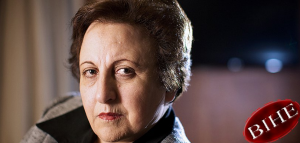Shirin Ebadi
1 May 2014
 According to articles twelve and thirteen of the constitution of the Islamic Republic of Iran, the official religion of Iran is Islam, and the official sect is Twelver Shi’ite. Although other sects of Islam, and the Jewish, Christian and Zoroastrian faiths are also recognized, their followers are not entitled to the same legal protection and privileges as a Shi’ite, and institutional religious discrimination is rampant in Iranian law and regulation.
According to articles twelve and thirteen of the constitution of the Islamic Republic of Iran, the official religion of Iran is Islam, and the official sect is Twelver Shi’ite. Although other sects of Islam, and the Jewish, Christian and Zoroastrian faiths are also recognized, their followers are not entitled to the same legal protection and privileges as a Shi’ite, and institutional religious discrimination is rampant in Iranian law and regulation.
The “reverse” interpretation of article thirteen might lead one to conclude that other religious minorities not listed, such as the Baha’i religion, are not officially recognized. As a result of such reasoning, Baha’is are not accorded even the meager rights granted to other non-Shi’ite sects under the law.
Followers of recognized religions may follow their faith practices of worship, religious education and communal practices such as marriage, divorce, inheritance and the like. They have the right to have a representative in the Islamic Consultative Assembly. However, these rights are denied to Baha’is, even though they represent the largest non-Muslim religious community in Iran which, based on the last published statistics, numbers over 300,000 adherents.
The Baha’i faith began in Iran. However, they have been subjected to severe persecution by various Iranian governments from the early days of the Faith. They are not, for example, allowed to bury their dead in public cemeteries, and are confined to specially designated Baha’i cemeteries, which are often attacked by agents of the government, desecrated and destroyed.
Baha’is in Iran have been deprived of almost all civil rights. For example, ever since the initiation of the Islamic Revolution of 1979, they have been denied entry into universities through the establishment of a “religious affiliation” clause in the application process. Since Baha’is do not attempt to hide their Faith, and are unwilling to lie to gain admittance into universities, they are easy targets for denial during the admission process.
Upon the election of President Mohammad Khatami in 1997, because he could not overtly overrule the admission process for Baha’is, yet wished to find a political solution to this egregious denial of human rights, he ordered that the “religious affiliation” clause be removed from the admission process. Thus a few Baha’i students managed to enroll in a few institutions.
Regrettably, the Ministry of Information discovered, through other means, those Baha’is who had been admitted, and found ways to expel them from Universities. I was a defense attorney for a few such Baha’is in 2002, and filed many petitions with the Administrative Courts on behalf of my clients, all to no avail.
The Iranian Baha’i community decided to look into possible solutions, and setup a non-official home-based University where a number of young Baha’i students enrolled and were getting an education. However, after a few years, during President Ahmadinejad’s tenure, security forces attacked their campus locations, confiscated computer and lab equipment, and jailed many of their professors and students. Even to this day, some of their professors linger in Iranian jails.
Baha’is are denied most of their civil rights. Not only are they barred from government and military employment , they also are denied the opportunity to own any business which requires a government permit, such as pastry shop, restaurant, hair salon and the like.*
* This is due to the Iranian legal application of a specific Shi’ite religious concept, in which certain categories of persons are considered to be “najes”, or “unclean”. For an article on how this has been applied to oppress Baha’is, see http://www.huffingtonpost.com/anthony-vance/iran-bahai_b_4320167.html
—
Translation by Iran Press Watch
May 5, 2014 4:39 pm
Thank you Shirin Ebadi for fighting for Human Rights and the cause of the Baha’i Community in Iran.
May 6, 2014 5:49 am
Deepest, deepest thanks to you Mrs. Shirin Ebadi! May God bless you forever!